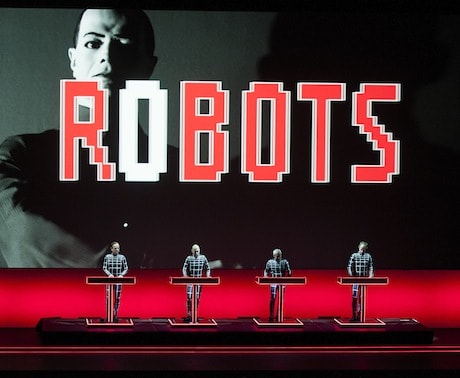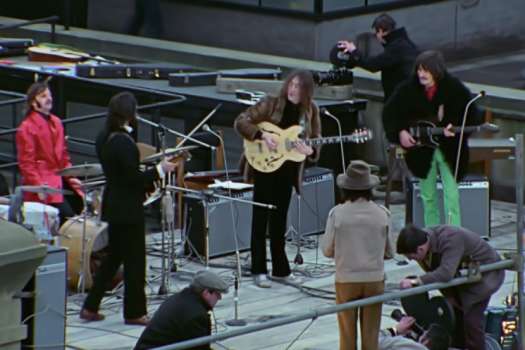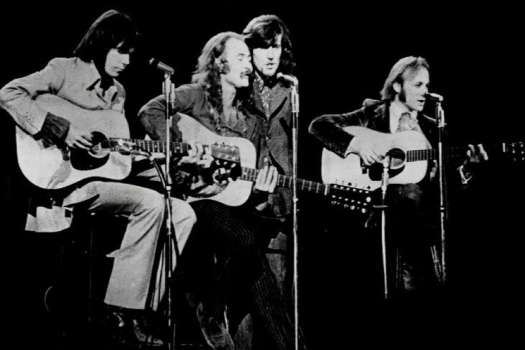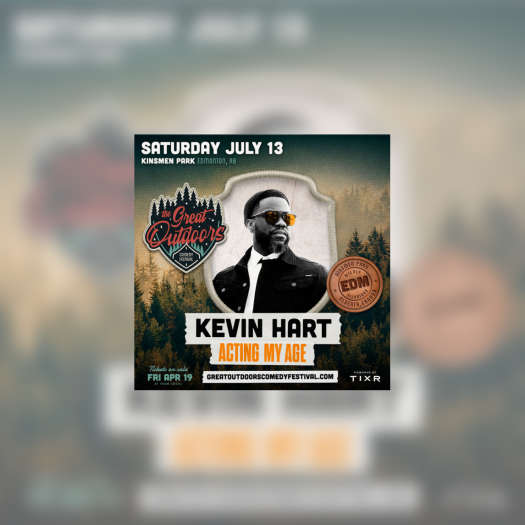Last night, German electronic music pioneers Kraftwerk brought their 3D tour to Toronto. The band's revelatory, career-spanning set reaffirmed their position as one of the greatest, most influential and artistically visionary groups alive.
As attendees shuffled into the Sony Centre, they received a small red envelope containing paper 3D glasses with the name "Kraftwerk" emblazoned on the side. The audience playfully acclimatized themselves to their new facial accessories, snapping goofy photos of themselves, and waiting in giddy anticipation to see what they would produce once the show got underway.
Suddenly the theatre was overtaken by that old, familiar vocoder voice, the lights dimmed, and there they were: Kraftwerk's four members standing behind their consoles, as 3D projections of their iconic lookalike robots descended behind them. They opened, fittingly, with "The Robots," from the 1978 album Man-Machine.
Founding member Ralf Hütter took up the left position and served as the "frontman" for much of the show. He sang and spoke most of the songs' lyrics in real time, sometimes through a vocoder and other times unfiltered, and played many of their keyboard lines live. For a band that could, if they so wished, perform entirely with pre-recorded music and vocal samples, this brought a palpable sense of personableness and spontaneity to the night.
The band performed in dim lighting as the screen behind them played a collage of 3D images in sync with the music. Words from the lyrics flashed across the screen over animations that were a direct, sometimes cheeky take on the songs: a lab in space for "Spacelab," a car traveling the Autobahn in "Autobahn"; at the conclusion of "Spacelab," the camera zoomed in on Toronto from outer space to show a 3D rendering of the CN Tower. The graphics were relatively basic in a way that perfectly complemented the band's music: they weren't pushing the limits of technology, but rather gazing at modern life and reproducing the feeling of wonder and human limitation we all experience when seeing something as complex as a computer or bullet train.
Their two-hour set contained material from 1974's Autobahn onward, or the eight albums they included in their Catalogue box set, and have been performing in their entirety at some stops on this tour. Old songs like "Computer Love" and "Man-Machine" sounded fresher than ever, brought to life by the venue's booming sound system and the band's occasional improvisations, while newer compositions like "Aerodynamik" and "Planet of Visions" made it abundantly clear that Kraftwerk are anything but a nostalgia act.
A large part of the set was taken up by two pieces, "Autobahn" and the "Tour de France" song series, both 20-plus minute long meditations on a theme. "Autobahn" moved forward and morphed like a car switching lanes and taking exits, while "Tour de France" charmingly built from a cyclist's breath to a theme song for pedalling through the Alps.
The show reached a surprising emotional peak with the song "Radioactivity." Released in 1975 on the album of the same name, the original lyrics to "Radioactivity" are a playful rumination on radio culture, but since then, the band have transformed the song into a call to end nuclear power and weapons. The newer lyrics list off the sites of infamous nuclear disasters: Chernobyl, Harrisburg, Sellafield, and, since 2012, Fukushima. Then comes the cry, "Stop radioactivity, it's in the air for you and me."
For a band whose lyrics are normally about the everyday activities of modern urban life, their one-off political statement in "Radioactivity" hit extra hard and evoked cheers from the crowd. It was a reminder that technology has its dangers and should be used with great care. This is especially meaningful coming from a band whose image is so throughly based on embracing technology and blurring the lines between man and machine.
Despite Kraftwerk's career of obscuring themselves behind synths, computers, and mechanical images, the most striking element of last night's show was its humanity. The band's four members are not ones for showboating, which rendered their small movements and smiles at the crowd all the more sincere and personable. As they exited the stage one by one, each performer took a few minutes to improvise on their consoles, and then the four returned for a group bow. There were no pretensions, no technological filters, just a genuine sense of joy and appreciation for the experience they had shared with the audience.
Back in the '70s, when a battle raged between disco and rock n' roll, Ralf Hütter was well known for saying that synths were a more sensitive instrument than guitars. Today, forty years later and with their legacy more apparent than ever, Kraftwerk showed that this might have been true all along.
Photo Gallery: FB, g+
As attendees shuffled into the Sony Centre, they received a small red envelope containing paper 3D glasses with the name "Kraftwerk" emblazoned on the side. The audience playfully acclimatized themselves to their new facial accessories, snapping goofy photos of themselves, and waiting in giddy anticipation to see what they would produce once the show got underway.
Suddenly the theatre was overtaken by that old, familiar vocoder voice, the lights dimmed, and there they were: Kraftwerk's four members standing behind their consoles, as 3D projections of their iconic lookalike robots descended behind them. They opened, fittingly, with "The Robots," from the 1978 album Man-Machine.
Founding member Ralf Hütter took up the left position and served as the "frontman" for much of the show. He sang and spoke most of the songs' lyrics in real time, sometimes through a vocoder and other times unfiltered, and played many of their keyboard lines live. For a band that could, if they so wished, perform entirely with pre-recorded music and vocal samples, this brought a palpable sense of personableness and spontaneity to the night.
The band performed in dim lighting as the screen behind them played a collage of 3D images in sync with the music. Words from the lyrics flashed across the screen over animations that were a direct, sometimes cheeky take on the songs: a lab in space for "Spacelab," a car traveling the Autobahn in "Autobahn"; at the conclusion of "Spacelab," the camera zoomed in on Toronto from outer space to show a 3D rendering of the CN Tower. The graphics were relatively basic in a way that perfectly complemented the band's music: they weren't pushing the limits of technology, but rather gazing at modern life and reproducing the feeling of wonder and human limitation we all experience when seeing something as complex as a computer or bullet train.
Their two-hour set contained material from 1974's Autobahn onward, or the eight albums they included in their Catalogue box set, and have been performing in their entirety at some stops on this tour. Old songs like "Computer Love" and "Man-Machine" sounded fresher than ever, brought to life by the venue's booming sound system and the band's occasional improvisations, while newer compositions like "Aerodynamik" and "Planet of Visions" made it abundantly clear that Kraftwerk are anything but a nostalgia act.
A large part of the set was taken up by two pieces, "Autobahn" and the "Tour de France" song series, both 20-plus minute long meditations on a theme. "Autobahn" moved forward and morphed like a car switching lanes and taking exits, while "Tour de France" charmingly built from a cyclist's breath to a theme song for pedalling through the Alps.
The show reached a surprising emotional peak with the song "Radioactivity." Released in 1975 on the album of the same name, the original lyrics to "Radioactivity" are a playful rumination on radio culture, but since then, the band have transformed the song into a call to end nuclear power and weapons. The newer lyrics list off the sites of infamous nuclear disasters: Chernobyl, Harrisburg, Sellafield, and, since 2012, Fukushima. Then comes the cry, "Stop radioactivity, it's in the air for you and me."
For a band whose lyrics are normally about the everyday activities of modern urban life, their one-off political statement in "Radioactivity" hit extra hard and evoked cheers from the crowd. It was a reminder that technology has its dangers and should be used with great care. This is especially meaningful coming from a band whose image is so throughly based on embracing technology and blurring the lines between man and machine.
Despite Kraftwerk's career of obscuring themselves behind synths, computers, and mechanical images, the most striking element of last night's show was its humanity. The band's four members are not ones for showboating, which rendered their small movements and smiles at the crowd all the more sincere and personable. As they exited the stage one by one, each performer took a few minutes to improvise on their consoles, and then the four returned for a group bow. There were no pretensions, no technological filters, just a genuine sense of joy and appreciation for the experience they had shared with the audience.
Back in the '70s, when a battle raged between disco and rock n' roll, Ralf Hütter was well known for saying that synths were a more sensitive instrument than guitars. Today, forty years later and with their legacy more apparent than ever, Kraftwerk showed that this might have been true all along.
Photo Gallery: FB, g+




